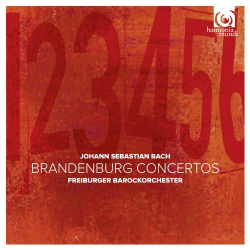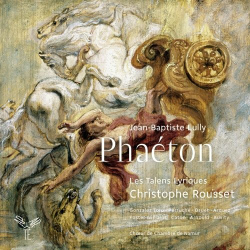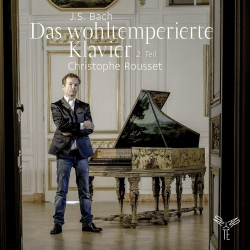Brandenburg Concertos may come and go, but when one of exceptional merit shows up, it is time to remember the many glories of the music and the times that were spent in listening to them, again and again.
Thanks to my pioneering father, I grew up listening to a chamber orchestra version by the Cento Soli Orchestra of Paris, conducted by Hermann Scherchen, with a real harpsichord (Ruggero Gerlin) on an obscure French label named Omega. It was sturdy and colorful and chugged endearingly along.
This new set from the leading edge Baroque Orchestra of Freiburg is considerably more expert, and more au courant in terms of the sophistication and knowledge that backs the way they play their instruments and put the music together interpretively.
It is a light, fleet-fingered, deftly bowed and bow-on reading which has enough plasticity in its phrase shaping and enough, at least occasional, uncertainties about what will happen next (particularly in the wonderful harpsichord cadenza in the Fifth). The music comes to life, even if, after listening for the whole two CDs worth, it begins to sound suspiciously like one long, admittedly delicious Bachian fabric, rather than, in any significant sense, the outward, six different concertos. Playing these splendid performance/recordings loud helps avoid this side effect (perhaps more accurately put, a side affect).
If you are a Lully fan, then you may be the first I have ever met. Not that Lully is a forbidden pleasure that causes Lullians to shun the light, but since I started encountering classical music types, I have never met a Lullian, or even discussed Lully seriously except at summer festival parties, when the mention of his name raises eyebrows and knowing snickers.
Not a problem. It is just conceivable that if a concerted effort is made now on his behalf, and a vogue created for the forms in which he principally wrote (sacred music, ballets de cour, theatrical music and quasi-operatic grand tragic tableaux), a vogue for Lully, if not a rage much less a commemorative rave, cannot be entirely ruled out for to mark the 400th anniversary of his birthday in 2032. With only 18 years to go, getting to know him and his music should be put on the front burner.
Luckily, Christophe Rousset and Les Talens Lyriques, perhaps smelling the scent, and having dispatched Lully's Bellerophon for the same label in 2011, are on the spot with their new Phaëton, the eighth tragédie lyrique Lully wrote with his pal the librettist Philippe Quinault.
First performed in 1683, Phaëton proved so popular that it was referred to as the ''opera of the people.'' As Christophe Rousset puts it, "Its airs were whistled at Versailles and on the bridges of Paris." And the final terrible scene retains its spectacular power.
Together, a brilliant cast headed by Emiliano Gonzalez Toro as Phaëton, Cyril Auvity playing three roles including Phaëton's father, the wonderful playing of the Talens lyriques and the singing of the Chœur de chambre de Namur rise to the level of Lully's grand inspiration and create a riveting thread of outwardly formal, inwardly deeply personal and affecting human drama. Gorgeous sound and sumptuous book style packaging with lavish full-color illustrations. Yum!
Over the course of his career, Christophe Rousset has consistently excelled in the integrity of his explorations, first as a harpsichordist and then as director of Les Talens Lyriques. Now firmly established on the Aparté label, after having been a Decca mainstay for many years (my fondest memory is of a Marin Marais recording he did with Christophe Coin called Suite d'un goût étranger), Rousset moves into the big leagues with the second book of Bach's Well-Tempered Clavier.
Written 20 years after the more well-known first book, and "stretching the limits of the possible," as Rousset writes in his booklet-note, WTC 2 may never be really jolly music, but listening to performance so authentically introspective is an awesome reminder of how much there is in its musical depths combined with a kind of wonder at how Bach was able to comprehend and convey so much beauty with such ordinary means.
Playing on a 1628 Ruckers harpsichord which has been preserved in the Chateau de Versailles since 1946, Rousset links the ordinary to the sublime in this musical Everest of its time. He is master of the diversity of styles which Bach calls forth, and of the miraculous touch needed to create the miraculous sounds.
In the interstices of these preludes and fugues, Bach is taking obvious joy mixed with humility at being able to command the forces of music; at some level he must have realized that he was a Prospero. The effect is always touching and sometimes grand, and foursquare too, as if Bach, by plotting the time and distance of musical eternity, were speaking to our human souls.



